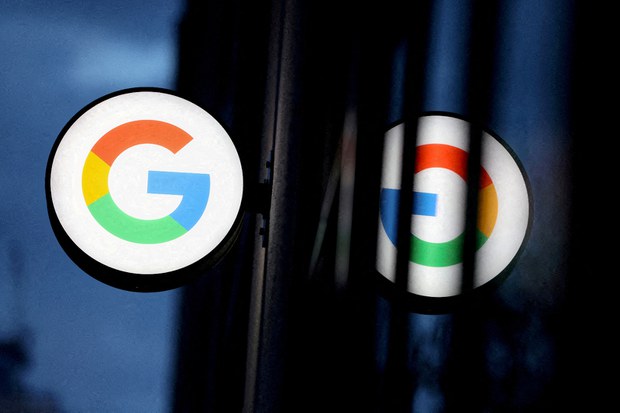Google agrees to content monitoring demand after Indonesia threatens to ban site
2022.07.18
Jakarta
 The Google logo is seen at the Google Store in Chelsea, in Manhattan, Nov. 17, 2021.
The Google logo is seen at the Google Store in Chelsea, in Manhattan, Nov. 17, 2021.
Google said Monday it would register its site for Indonesian government monitoring after Jakarta threatened to block social media platforms if they failed to sign up by July 20, citing a regulation that activists criticized as an affront to free speech.
The Ministry of Communications and Information Technology has said the 2020 regulation aims to protect domestic users from prohibited content, which is defined as content that violates laws, causes public unease, or disrupts public order.
“We are aware of the requirement to register as per relevant regulations, and will take appropriate action to comply,” the Indonesian representative of Google, a search engine and news aggregator, told BenarNews, declining to comment further.
Johnny G. Plate, the minister for communications and information technology, said last week that the deadline for registration was this coming Wednesday.
“Registering is easy because it’s done in a single online submission, so there are no more excuses about administrative hurdles,” he said.
He said global services, including popular social media platform TikTok, had registered.
According to the regulation, platforms are required to comply with most content removal orders within 24 hours for most content and within four hours for urgent requests to take down content, such as that involving terrorism, child sexual abuse images, and content that causes “unrest in society or disturbs public order.”
On Monday, the Southeast Asia Freedom of Expression Network (SAFEnet), an Indonesian NGO, warned that provisions in the regulation could infringe on citizens’ rights.
They could be used as a pretext to ban critical speech, SAFEnet said in a statement.
“This kind of registration requirement is a violation of the right to freedom of expression, and can only be accepted if it is really necessary to achieve a legitimate purpose,” SAFEnet said.
The regulation, issued in November 2020, applies to companies that provide online services, engage in online businesses, or whose online platforms are used in Indonesia.
Those that fail to comply would be given a written warning, temporary suspension, administrative penalties or will see access to their platforms blocked, according to the ministry.
The information required in the registration include a contact person to receive any takedown request on content, the number of users and transactions from Indonesia and a pledge to provide access including for law enforcement purposes.
Indonesia, a nation of 270 million people, is a prolific user of social media. Government officials in recent years have warned that terrorist organizations, including the Islamic State militant group, were using such online platforms to spread propaganda and recruit young Indonesians.
In 2017, the Indonesian government agreed with YouTube and Twitter to tighten monitoring by allowing selected users to flag material deemed as being linked to terrorism.
Since 2014, Indonesia has imposed the so-called Internet Positif program, which involves blocking of pornographic websites and those with content deemed negative, including Reddit and Vimeo.
Critics say because some sites that are generally considered harmless are also blocked, the program is akin to internet censorship.
‘What are the benefits?’
Internet freedom activist Enda Nasution said although the communication ministry’s regulation requiring services to register has potential benefits, it should be optional for global services with a presence in many countries, such as Google and Facebook.
“I don't believe the government can block them, but if they have to register, what are the benefits for them? It will be difficult for them to comply considering their complex operations," he told BenarNews.
Blocking platforms like Google would hurt businesses, including small and medium companies relying on free services, he said.
“Google services such maps and email are widely used,” including by transport and food delivery apps.
According to the Article 19, a London-based NGO that advocates for information freedom, the regulation requiring intermediaries to proactively monitor and filter content and to comply with takedown orders from the ministry, violates international human rights standards.
“Extremely short removal timeframes, such as four and 24 hours, make it virtually impossible to carefully review notices. It increases the risk of restricting legitimate and lawful expression,” it said late last year in a statement.
“The blanket obligation to provide government authorities data access may be incompatible with the national laws of most ESOs’ [electronic system operators] home countries and is certainly at odds with international privacy rights norms,” it said.
Alvin Prasetyo in Jakarta contributed to this report.







